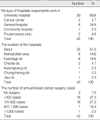Abstract
Purpose
The aim of this study is to examine practice patterns of surgeons for the management of hereditary breast cancer in Korea.
Methods
A structured questionnaire was circulated to the members of the Korean Breast Cancer Society through e-mail distribution between 6 July and 14 August 2007. A total of 43 surgeons from 42 hospitals responded to the survey.
Results
Of the respondents, 81.4% (n=35) asked for information related to the family histories of cancer and 58.1% (n=25) recommended genetic testing for their patients. Indications for genetic testing recommended by the 25 surgeons were the following: breast cancer patients with family histories of breast or ovarian cancer (96%), bilateral breast cancer (80%), early-onset (64%) or male breast cancer (52%), and a double primary malignancy with breast and ovarian cancer (36%). Of the respondents, 52% (13/25) performed genetic counseling before genetic testing, and the surgeons (81.3%, 13/16) or genetic counselors (18.7%, 3/16) provided the genetic counseling. Although 154 BRCA1/2 mutation carriers of 95 families have been identified so far, only 12 family members were managed for prophylaxis by tamoxifen chemoprevention (n=2), a contralateral prophylactic mastectomy (n=2) or a prophylactic oophorectomy (n=8). There was no report of a bilateral prophylactic mastectomy being performed.
Conclusion
Although BRCA1/2 mutation carriers for high-risk patients with hereditary breast cancer have been identified in Korea, practice and management for cancer prevention does not seem to be actively performed. The Korean Hereditary Breast Cancer (KOHBRA) Study will serve to establish the Korean guidelines of evidence-based clinical practice for hereditary breast cancer.
Figures and Tables
References
1. Claus EB, Schildkraut JM, Thompson WD, Risch NJ. The genetic attributable risk of breast and ovarian cancer. Cancer. 1996. 77:2318–2324.

2. Friedman LS, Ostermeyer EA, Szabo CI, Dowd P, Lynch ED, Rowell SE, et al. Confirmation of BRCA1 by analysis of germline mutations linked to breast and ovarian cancer in ten families. Nat Genet. 1994. 8:399–404.

3. Wooster R, Bignell G, Lancaster J, Swift S, Seal S, Mangion J, et al. Identification of the breast cancer susceptibility gene BRCA2. Nature. 1995. 378:789–792.

4. Kang DH, Kim SW, Noh DY, Ahn YO, You KY. Hereditary breast cancer syndrome. Breast. 2005. 2:179–188.
5. Antoniou A, Pharoah PD, Narod S, Risch HA, Eyfjord JE, Hopper JL, et al. Average risks of breast and ovarian cancer associated with BRCA1 or BRCA2 mutations detected in case Series unselected for family history: a combined analysis of 22 studies. Am J Hum Genet. 2003. 72:1117–1130.

6. Ford D, Easton DF, Stratton M, Narod S, Goldgar D, Devilee P, et al. Genetic heterogeneity and penetrance analysis of the BRCA1 and BRCA2 genes in breast cancer families: the breast cancer linkage consortium. Am J Hum Genet. 1998. 62:676–689.

7. Kim SW, Lee CS, Fey JV, Borgen PI, Boyd J. Prevalence of BRCA2 mutations in a hospital based series of unselected breast cancer cases. J Med Genet. 2005. 42:e5.

8. Couch FJ, DeShano ML, Blackwood MA, Calzone K, Stopfer J, Campeau L, et al. BRCA1 mutations in women attending clinics that evaluate the risk of breast cancer. N Engl J Med. 1997. 336:1409–1415.

9. Shattuck-Eidens D, Oliphant A, McClure M, McBride C, Gupte J, Rubano T, et al. BRCA1 sequence analysis in women at high risk for susceptibility mutations. Risk factor analysis and implications for genetic testing. JAMA. 1997. 278:1242–1250.

10. Frank TS, Deffenbaugh AM, Reid JE, Hulick M, Ward BE, Lingenfelter B, et al. Clinical characteristics of individuals with germline mutations in BRCA1 and BRCA2: analysis of 10,000 individuals. J Clin Oncol. 2002. 20:1480–1490.

11. Ferla CV, Cascio S, Rinaldi G, Badalamenti G, Carreca I, Surmacz E, et al. Founder mutations in BRCA1 and BRCA2 genes. Ann Oncol. 2007. 18:93–98.

12. Warner E, Foulkes W, Goodwin P, Meschino W, Blondal J, Paterson C, et al. Prevalence and penetrance of BRCA1 and BRCA2 gene mutations in unselected Ashkenazi Jewish women with breast cancer. J Natl Cancer Inst. 1999. 91:1241–1247.

13. Johannesdottir G, Gudmundsson J, Bergthorsson JT, Arason A, Agnarsson BA, Eiriksdottir G, et al. High prevalence of the 999del5 mutation in icelandic breast and ovarian cancer patients. Cancer Res. 1996. 56:3663–3665.
14. Oh JW, Noh DY, Choi KJ, Kang SB, Kim IS, Noh MS, et al. BRCA 1 germline mutation in Korean breast and ovarian cancer patients. J Korean Oncology. 1995. 27:1061–1069.
15. Kang HC, Kim IJ, Park JH, Kwon HJ, Won YJ, Heo SC, et al. Germline mutations of BRCA1 and BRCA2 in Korean breast and/or ovarian cancer families. Hum Mutat. 2002. 20:235.

16. Choi DH, Lee MH, Bale AE, Carter D, Haffty BG. Incidence of BRCA1 and BRCA2 mutations in young Korean breast cancer patients. J Clin Oncol. 2004. 22:1638–1645.

17. Ahn SH, Son BH, Yoon KS, Noh DY, Han W, Kim SW, et al. BRCA1 and BRCA2 germline mutations in Korean breast cancer patients at high risk of carrying mutations. Cancer Letters. 2007. 245:90–95.

18. Green MJ, Biesecker BB, McInerney AM, Mauger D, Fost N. An Interactive Computer Program Can Effectively Educate Patients About Genetic Testing for Breast Cancer Susceptibility. Am J Med Genet. 2001. 103:16–23.





 PDF
PDF ePub
ePub Citation
Citation Print
Print







 XML Download
XML Download